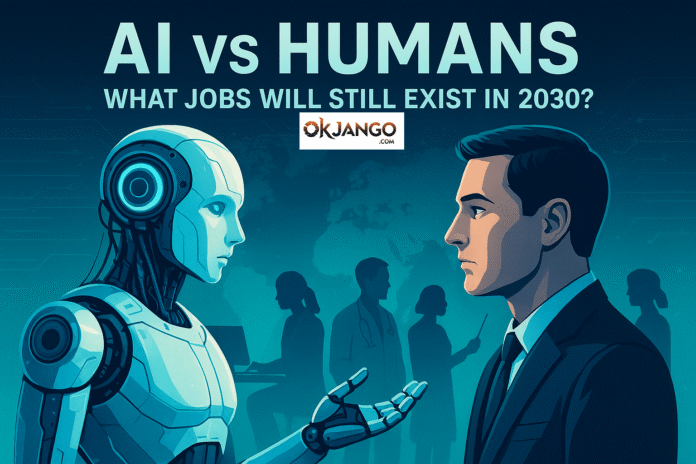Introduction: The Great AI vs Humans Divide
The conversation around Artificial Intelligence (AI) has shifted from fascination to concern. From chatbots writing essays to robots assembling cars, AI’s influence on employment has become impossible to ignore.
As machines learn faster and think smarter, many wonder: Will there still be jobs left for humans in 2030?
The truth is while AI will automate repetitive and data-driven tasks, it will also create new opportunities that depend on creativity, empathy, ethics, and human intuition.
Let’s explore which professions will stand strong in the face of automation and why humanity still holds the upper hand in many areas.
💼 Jobs That Will Still Exist in 2030 (and Thrive)
1. Creative Professionals
AI can generate text and art, but it lacks emotional intelligence and originality.
Writers, designers, filmmakers, and musicians who infuse emotion and culture into their work will remain irreplaceable.
2. Healthcare Workers
While AI assists in diagnostics, doctors, nurses, and therapists bring compassion and critical human judgment.
Healthcare will evolve, not disappear — blending AI’s precision with human care.
3. Educators and Trainers
Machines can teach information, but teachers inspire transformation. The demand for educators — especially those integrating AI tools — will continue to grow by 2030.
4. Psychologists and Counselors
Empathy cannot be programmed. Mental health professionals will be more vital than ever as technology deepens human isolation and stress.
5. AI Ethics and Policy Experts
As AI grows powerful, so does the need for AI ethicists, regulators, and data privacy experts to ensure fairness, safety, and accountability.
6. Skilled Trades
Jobs requiring manual dexterity and on-site problem-solving — electricians, plumbers, mechanics — remain difficult for AI to automate due to physical and situational complexity.
7. Entrepreneurs and Innovators
The rise of AI opens new business opportunities. Visionary entrepreneurs who merge technology and human needs will define the next decade.
⚙️ Industries Most Affected by AI
- Manufacturing: Automation will dominate, but roles in AI maintenance and process supervision will rise.
- Finance: AI will handle analytics, but financial advisors with empathy and strategy skills will remain essential.
- Customer Service: Chatbots will handle FAQs, while humans will manage complex, emotional, or creative interactions.
💡 How to Stay Relevant in the AI Era
- Learn new digital skills: AI literacy, data analysis, coding basics.
- Develop soft skills: Creativity, emotional intelligence, critical thinking.
- Adapt and innovate: Stay curious and ready to evolve with technology.
🌐 External Links
- World Economic Forum – The Future of Jobs Report 2025
- McKinsey – Jobs Lost, Jobs Gained: Workforce Transitions in a Time of Automation
- UNESCO – The Role of Education in the AI Era
- Harvard Business Review – Why Emotional Intelligence Still Matters
Frequently Asked Questions (FAQs)
Will AI replace all human jobs by 2030?
No, AI will replace some roles, particularly those involving routine tasks, but it will also create new ones. Human creativity, empathy, and leadership cannot be automated.
Which jobs are safe from AI automation?
Careers in healthcare, education, psychology, creative industries, skilled trades, and AI ethics are expected to remain in demand due to their human-centric nature.
How can I prepare for an AI-driven future?
Focus on continuous learning, emotional intelligence, and tech adaptability. Combine technical skills with creativity to stay competitive.
Will AI create more jobs than it replaces?
According to reports by the World Economic Forum, AI could create more roles than it eliminates — particularly in tech, education, and sustainability sectors.
What are the best AI-proof skills to learn now?
- Problem-solving
- Creativity
- Emotional intelligence
- Digital literacy
- Communication
Explore OKJango’s Technology Section for unbiased AI comparisons and insights.
Read more blogs at : Okjango.com


